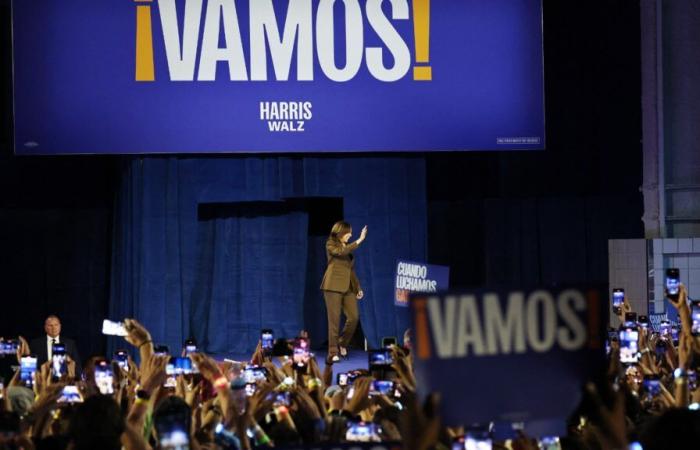This is one of the challenges of the American presidential election: Kamala Harris and Donald Trump are courting minorities who could swing the election in certain states. While these communities traditionally lean toward the Democratic side, their support is eroding in favor of Donald Trump.
More than ever, every voice counts. While Kamala Harris and Donald Trump are neck and neck in the polls, both candidates are focused on convincing minorities by sending them personalized messages, whether during campaign events or through advertisements.
African-Americans, Hispanics… These communities can play a decisive role on November 5, particularly in key states (swing states), able to swing the election depending on whether they fall into the Democratic or Republican fold.
· African-Americans not a foregone conclusion for Kamala Harris
It is one of the pillars of the Democratic electorate. African Americans, representing 13.7% of the population according to the US Census Bureau, voted more than 90% of them for Barack Obama, Hillary Clinton and Joe Biden in previous elections.
But for Kamala Harris, this pool of votes does not seem to be a foregone conclusion. Only 78% of African-Americans plan to vote for her, according to a New York Times/Siena College opinion poll published October 12. The Democrat is experiencing difficulties in particular with black men, with only 69% of them saying they want to vote for her according to the same survey.
Ce gender gap (gender gap) is observed on the scale of the entire population, but is seen even more in an electorate which usually votes en bloc for the Democratic camp. The first black American president, Barack Obama warned his “brothers” hesitant to rally Kamala Harris. “You give all sorts of reasons and excuses. That poses a problem to me. It makes me think that you don't like the idea of having a woman as president,” he said in Pittsburgh on October 10.
Besides the question of gender, how can we explain this -relative- disenchantment? “Despite posting good economic results, the Biden administration has failed to improve the living conditions of black Americans in city centers,” underlines Olivier Richomme, professor of American civilization at Lyon 2-Lumière University. .
The fact that Kamala Harris herself is a black woman also did not have the expected loving effect. “She is the daughter of a Jamaican father and an Indian mother. Her life story does not necessarily resonate with the African-American electorate who are descendants of slaves,” says Olivier Richomme. The Democrat, however, graduated from Howard University, the “Harvard” of black Americans, where she forged a network in African-American sororities.
Aware of these difficulties, Kamala Harris, who has received the support of many black stars like Stevie Wonder and Lizzo, has developed a series of proposals supposed to directly benefit African-American men. This program aims to help them launch their small business or trade, in particular thanks to advantageous loans, but also contains training and apprenticeship aid, as well as a system of favored access to professions in the education.
The vote of African Americans will be particularly crucial in Georgia, where they represent nearly a third of the population. This key state was won by Joe Biden in 2020… with a small 12,000 vote lead over Donald Trump.
· Hispanics and Latin Americans tempted by Donald Trump
The category of “Hispanics and Latinos” makes up 19.5% of the U.S. population, according to the Census Bureau and represents the second largest ethnic group after “Whites.”
“It’s a larger electorate, but traditionally less politicized than African-Americans,” describes Olivier Richomme. However, its political weight increases from election to election. This year, 36 million Latinos are registered to vote, 4 million more than in 2020 and more than double than in 2000, according to the Pew Research Center. The participation rate among the minority is also tending to increase and exceeded the 50% threshold for the first time in 2020.
If the Democratic camp is traditionally favored by this electorate, this support seems to be crumbling. When 71% of Latin Americans voted for Barack Obama in 2012, only 59% voted for Joe Biden in 2020, again according to the Pew Research Center. A curve that Kamala Harris, credited with 57% of voting intentions in the Latino electorate at the beginning of September, is currently struggling to straighten.
As for the African-American electorate, the lack of improvement in the economic situation of Latin Americans may explain the temptation to vote for Donald Trump. 85% of them believe that the economy will be “very important” in their choice of candidate and more than half (52%) have “confidence” in the economic policy of the former Republican president.
While immigration occupies a central place in the campaign, the hostility towards migrants displayed by Donald Trump can paradoxically appeal to these voters. “Many Latinos want to 'shut the door behind them' and limit immigration. They are also not immune to xenophobia and the temptation of the strong man,” underlines United States specialist Olivier Richomme.
According to a New York Times/Siena College poll carried out in early October, most Latin Americans do not feel concerned when Donald Trump accuses migrants of being criminals and “blood poisoning” of the country.
However, in the home stretch of the campaign, a comedian supporting Donald Trump made racist remarks against the Spanish-speaking territory of Puerto Rico, referred to as a “floating island of garbage”. A statement from which Donald Trump dissociated himself, but which could have serious consequences, almost 4 million Americans being of Puerto Rican origin.
If Latin Americans have never played a pivotal role in an election, this time they could swing the vote in certain key states where their demographics are exploding, such as in Nevada or Arizona.
· Asians, a growing electorate
The third minority in the country, Asian Americans are also seeing their demographic and political weight increase. Of mainly Chinese, Filipino or Indian origin, in 2023 they represented 6.4% of the American population, compared to only 1.5% in the 1980s.
According to the Pew Research Center, approximately 15 million Asian Americans are eligible to vote in 2024, an increase of 15% compared to the 2020 elections (+12% for Latinos and +7% for Afro -Americans).
Long neglected by pollsters, the political behavior of Asian Americans is less well known. In 2020, a majority of them (between 60 and 70% according to different exit polls) gave their vote to Joe Biden.
Daughter of an Indian oncologist and researcher, Kamala Harris can hope to gain votes in this community. According to recent surveys, it is benefiting from favorable dynamics.
According to a survey by the NORC Institute at the University of Chicago published in September, 66% of Asian Americans plan to vote for Kamala Harris, while only 46% said they wanted to cast a Joe Biden ballot in July according to the same institute. The vote of the Asian community could weigh heavily in the key state of Nevada, where it represents 11% of voters.
· The weight of religious minorities
Religious minorities are the subject of particular attention this year in the United States, against a backdrop of conflicts in the Middle East and protest movements in the streets and American campuses.
Classified as “white” in the federal census, Arab-Americans represent a small minority of three million people. However, this could make the difference in Michigan. In this swing state won by a short head by Joe Biden in 2020, Kamala Harris faces the distrust of part of the Arab-Muslim electorate, who criticize her administration for its armed support for Israel.
The pro-Palestinian movement “Uncommitted”, which had already called for a protest vote against Joe Biden during the Democratic primaries, thus positioned itself against Donald Trump, but without explicitly supporting Kamala Harris.
Larger demographically, the Jewish minority – around 7 million Americans – historically leans towards the Democratic side. According to a study by the Pew Research Center published on September 9, 65% of Jews say they want to vote for Kamala Harris. His Republican rival was also annoyed, going so far as to assert that Jews would have to have their heads “examined” if they voted Democratic and “would have a lot to do with” a possible Republican defeat. The American Jewish Committee denounced “dangerous” rhetoric and the Jewish Council for Public Affairs (JCPA) criticized the candidate for using “anti-Semitic stereotypes”.
Finally, the 50 million Catholic Americans form the largest faith community in the country, or 20% of the population. According to the Pew Research Center, a small majority (52%) plans to vote for Donald Trump, whose running mate JD Vance is Catholic. Kamala Harris, who opposed the Catholic Church on the subject of abortion, seems to have less importance for this electorate. Unlike Donald Trump, she did not attend the Alfred E. Smith Memorial Foundation dinner, a Catholic charity event popular with White House candidates.






